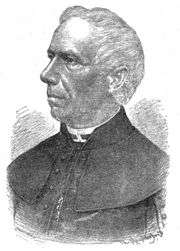Anthony Petrushevych

Anthony Petrushevych (January 18, 1821 – September 23, 1913) (Ukrainian: Петруше́вич Анто́ній Степа́нович) was a Ukrainian and Polish historian, linguist, researcher of the history of Galicia, a priest of the UGCC.
Biography
He was born in the village Dobriany, Kingdom of Galicia and Lodomeria, crown land of the Habsburg Monarchy, the Austrian Empire[1] in the family of local pastor UGCC of Stephan Petrushevych (1772-1850).[2] (Now – Dobriany, Stryi Raion). He studied in Stryi, in the Lviv University (graduated 1845) and in the Greek-Catholic theological seminary. From 1851 to 1858 he was an adviser to the consistory, was the personal secretary of Metropolitan Michael Levitsky. He was an Ambassador to the Galician Sejm (1861-1877) and Ambassador to the Austrian Parliament (1873-1878). He died in Lviv at the age of 92 years and he was buried at the Lychakiv Cemetery.[3]
Scientific research
The subject of the first research of Petrushevych had a history of the church in Galicia. Later – Slavic philology, ethnography, the study of archaeological remains and archival rarities. His, total 120, scientific papers related to the history of Galicia in the different eras. In the discussion about the original conception of August Belovsky about the existence of two Galichs - one of which was to be the center of Galician kingdom, which was located on the territory of present-day Slovakia (11th-12th centuries), and the other - the center of Galician principality on the Carpathian region (the middle of the 12th to 13th centuries). Petrushevych in his work “Whether two Galic? – 1865” convincingly showed that there was only one Halych, located on the Dniester, which was the capital of the principality of Halych in the 12th and 13th centuries.
Ivan Franko expressed surprise at the works of Petrushevych – from national-patriotic, pro-Ukrainian in early works, up to a typical Russian.[4]
Some of his important works were:
- Russia and Poland - 1849
- Graven image, which opened in Zbruch - 1851
- About forged Bohemian monuments - 1879
- Volyn-Galician Chronicle, compiled by the end of the 13th century. 1205-1295. - 1871
- Summary Galician-Russian chronicle. 6 T. - 1874-1897.
See also
References
External links
- «ВІСНИК ПРИКАРПАТСЬКОГО УНІВЕРСИТЕТУ ІСТОРІЯ Випуск 19 Видається з 1995 р. ІВАНО-ФРАНКІВСЬК Прикарпатський національний університет імені Василя Стефаника 2011 Вісник ...» Сторінка 33 (Ukrainian)
- Хто ж більший? Іван Франко (Ukrainian)